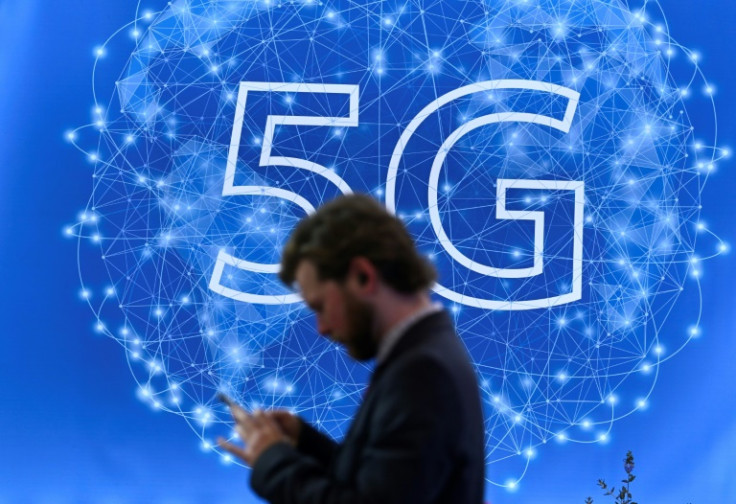6G Mobile Network Will Roll Out By 2030, Tech Execs Say: What's The Difference?

KEY POINTS
- Companies are still looking to make a return on their investments in 5G
- Some executives said that they are currently avoiding hype for 6G to avoid confusing consumers
- The speeds from 6G could be 50 times faster than 5G's speed
Executives at technology and telecommunications firms expect 6G, the next generation of mobile internet after 5G, to launch by 2030 even amid low adoption of the 5G network globally.
Among these executives were Nokia CEO Pekka Lundmark and Nick McKeown, senior vice president at Intel's Network and Edge Group, according to a CNBC report.
McKeown told the outlet he predicts 6G will be rolled out in 2030, with 6G standards being set a few years before.
"So the standards work is actively taking place in these standards, right now. And there's a certain amount of, you know, figuring out testing and probing on different technologies, a little bit of jockeying for position on what the technology will be," McKeown said last week.
Work is currently underway on 6G standards through standards-setting bodies like 3GPP, which contributed to 5G. However, standards, which are rules that would define how a network such as 6G works and its interoperability around the world, take several years to finalize, according to CNBC.
Meanwhile, BT's technology chief Howard Watson told CNBC that he thinks 6G will be launched around the 2032 Olympics in Australia, as next generations of mobile networks are usually rolled out around the international multi-sport event.
Some executives said that they are currently avoiding hype for 6G to avoid confusing consumers,
"We have not completed the deployment of 5G yet," Ha Min Yong, chief development officer of SK Telecom, told CNBC during the Mobile World Congress last week. "I don't think it's mature enough to talk about 6G seriously ... it's already a bit too early."
Companies are also reportedly still seeking a return on their multibillion-dollar investments on the fifth-generation mobile network, which began rolling out in 2019.
"5G adoption is accelerating in most countries where it has been deployed (including India, which is rapidly building 5G networks), but consumer subscribers are only one metric of take-up – ultimately enterprise markets, and industrial segments are where much of the potential is," Richard Webb, director of network infrastructure at CCS Insight, told CNBC via email.
According to an analysis by Open Signal, smartphones with 5G technology were seen enjoying almost triple the speed gain compared to 4G models from the same brands. Download speeds with 5G also reportedly outperform both 4G and Wi-Fi by five to eight times in developing economies such as the Philippines.
The sixth generation of the mobile network is expected to be faster.
According to a report by Singapore-based media outlet The Strait Times, 6G could promise speeds up to a hundred times faster than 5G, with significantly less transmission lag. 6G's peak data rates could reach 1,000 gigabits per second (Gbps), which is 50 times higher compared to 5G's 10 Gbps.
In addition to providing faster download speeds, 5G was positioned by the telecoms industry as a network that could underpin new technologies like driverless cars or unpiloted air taxis, according to CNBC. It has lower latency than 4G, which meant the time it takes for devices to talk to each other is significantly reduced when using 5G.
But Nokia, whose Nokia Bell Labs has already begun the research to make 6G available commercially by 2030, said that every single improvement in network connectivity that 5G will bring to the end-user will get further perfected with 6G.
"Whether it's smart cities, farms or factories, and robotics, 6G will take it to the next level," the company said in a statement. "Much of that will be facilitated by 5G-Advanced, the next standard enhancements for 5G. It comes with improved efficiency and extended capabilities and improved user experience."
According to the company, 6G will also reportedly enable new use cases. "We will connect the physical world to our own human world, thanks to the massive scale deployment of sensors and artificial intelligence and machine learning (AI/ML) with digital twin models and real-time synchronous updates," it said.
In 2021, Japanese tech company Fujitsu also announced that it has partnered with Nippon Telegraph and Telephone Corporation (NTT) to make 6G happen by 2030.
"With NTT's cooperation, we want to create a foundation for realizing a 6G society," Fujitsu 6G Platform Development Office director Shuji Miyata said earlier. "However, in order for 6G to actually benefit society at the consumer level, not just the foundation for infrastructure, but several new services must also be created."

© Copyright IBTimes 2024. All rights reserved.





















